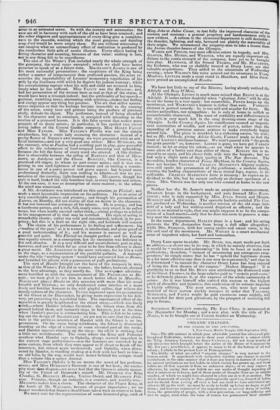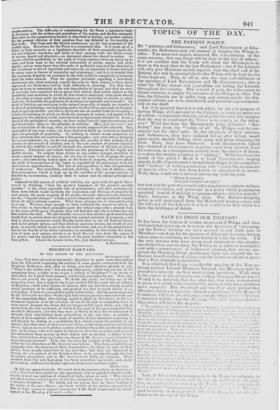ORGANIC CHANGES.
TO THE EDITOR OF THE SFECTATOR.
New Court, Middle Temple, 25th September 1837. Sin—The able manner in which your admirable journal has advocated phi- losophical Radicalism, induces me to draw your attention to a subject which the Whig Attorney-General, Sir JOHN CAMtra,E,.t., dill not deem worthy of any discussion when brought before the notice of the House of Commons by EWA UT ; nevertheless, it appears to many to lie at the bottom of all real reform ; I allude to the present Law of Primogeniture. The dislike of what are called " organic changes " is very natural to the human mind. It apprehends with instinctive timidity any change in ancient institutions, in the same manner that it fears any heresy in matters of religion ; for ancient institutions are but habits in which society has grown up, and those habits are all that separate it from an unknown abyss ; or we may express it otherwise, by saying that our habits are our MIMICS of thought regarding all that it interests us to know, and of those modes of thought there are an infinite number, of which we might have chanced to select one as well as another. The whole framework of society is thus, philosophically speaking, formed of habit, and we shrink from casting off even a bad one until we have substituted an- other to fill up the void : we must be ready to build up before we begin to pull down ; and however convinced of the imperfection or natural decay of institu• s, the generality of people, with a wise precaution, are long-suffering and IOW to anger, even when the voice of reason has pronounced their absolute condemnation. The difficulty of substituting for the Peers a legislative body in harmony with the wishes and prejudices of the nation, and the few examples that exist in the constitutionsknown or described in history, are greater reasons for the present oblivion of that question than any disbelief in the inutility of that body. The Pope and the British aristocracy are the last remnants of the middle ages. Reverence for the Peers is a compound idea. It is made up of a belief in their necessity as a legislative chamber, of their essentially monarchi- cal and religious character, and lastly of their analogy with the whole course of nature, moral and physical,—an argument almost too absurd to notice. As nature exhibits gradations in the scale of living creatures from an oyster up to man, and from man to the celestial hierarchies of spirits, angels, and arch- angels, and as some fancy that this order of perfection may even be observed in the inanimate world of vegetables and minerals, an argument is thence deduced by many sages in favour of monarchy and aristocracy ; and it is contended that the enormous disparity we maintain in the body politic is completely in harmony with the order natural. That the opinions prevalent regarding a hereditary aristocracy are, when analyzed, exactly the same in their nature as those above expressed, we think there will be little difficulty in showing. For that there must be some to command, as the sole depositories of power, and that we must of necessity have superiors whose power and station shall not be subject to the instability and mutation to which all that exists is subjected, what more absurd is this than to argue with the Schoolmen on the inequality of spirits, or admit with the Alchemists the gradations of excellence in vegetable and minerals? In- stead of limiting our reasoning to the natural inequality of minds, we transfer it to that of generations, and in practice prefer the hereditary principle to the prin- ciple of peerage for life; and this is the result also of another train of reasoning— a train of reasoning in which we think the precepts of nature, and regard to her example in the physical world, have not been so ingeniously attended to. From a dread of the principle of anarchy, we have rushed into the opposite extreme, and sacrificed every thing to the principle of stability. .Man, and fhr ever ! was the exclamation of the sage, who, in these words, expressed the solecism. But, unmindful of our true nature, we have desired to build up institutions founded upon the principle of perpetuity. As nothing in nature seems perpetual, we have admitted into our institutions a false principle ; and, error always bringing its own punishment, we are for ever paying the penalty of this mistake in re- sistance to the march of intellect, and in the vast amount of private injustice by which this stability is upheld through the institution of the law of primo- geniture. Education and refined habits are the patrimony of the higher and middle classes. To subject these classes to any sudden changes, would be to create a great amount of misery, fur the loss of caste is of all pangs the most acute ; and caste being looked upon as the fruits of property, whatever affects the mode of transmission of the latter is regarded by the aristocracy with the most jealous apprehensions. The law of primogeniture is thus the palladium of aristocracy. But mutability, and not stability, is the law of nature ; and that permanence which is kept up by the sacrifice of the greater portion of families is, we conceive, contrary both to nature and the eternal principles of justice. Opposed to this system of artificial stability, we agree with the great BEN.. THASI in thinking, "that the greatest happiness of the greatest possible number" is the more equitable rule of government ; and that consequently those laws which would facilitate the acquisition and division of property by and among the great majority of the people, through education and industry,
are the " organic changes" which a great commercial and agricultural country above all other reforms requires. What those changes are, it does not become us to say. We have done enough to have indicated the sources to which all
who desire to have fixed principles upon the subject may refer ; assured that, in the pages of the great lawgiver, they will find not only the best laws but the
best reasons for laws. We also humbly conceive that another good moral result
would flow to society from the frequent but natural mutation of property,—and that is, that its possessors would thereby know that we are all born to labour,
each in his proper sphere, and that whoever possesses leisure, the result of pro-
perty, is morally bound to use it by the cultivation and use of his mental facul- ties for the benefit of his fellow creatures, in extending by knowledge the domi- nion of man over nature, which is, as Lord BACON says, both the source of his power and the legitimate exercise of the great faculties wherewith he has
been gifted. I have the honour to be, Sir, your obedient servant,
A BARRISTER.



























 Previous page
Previous page